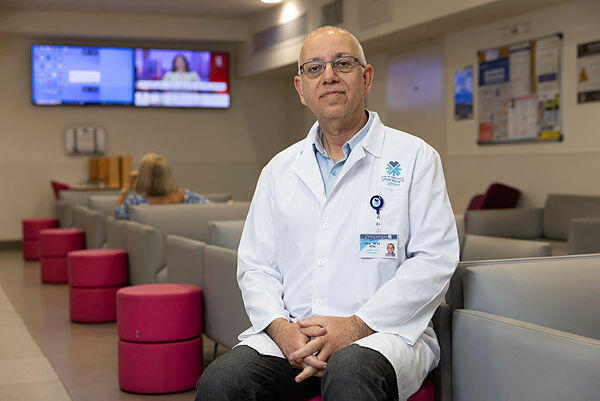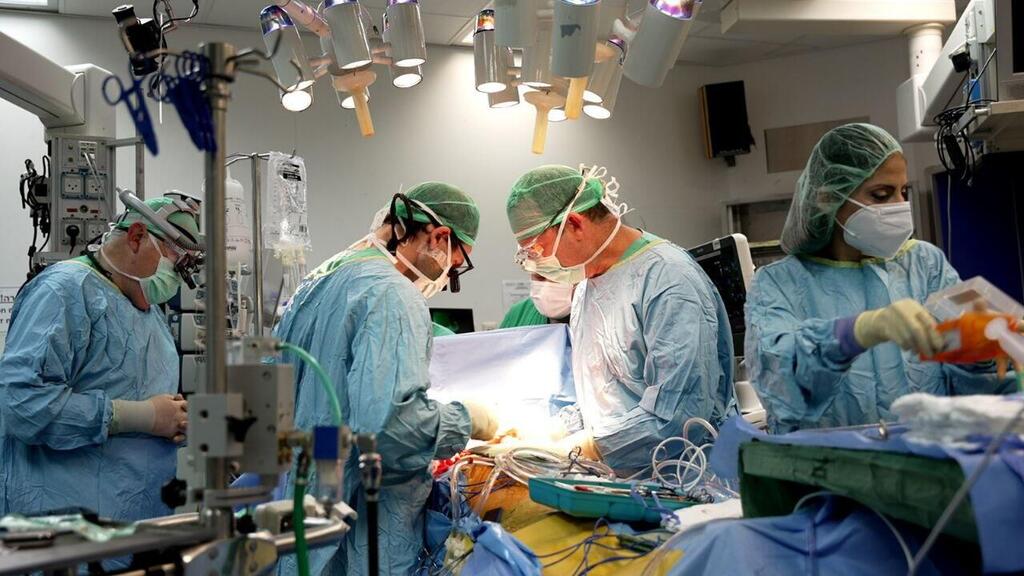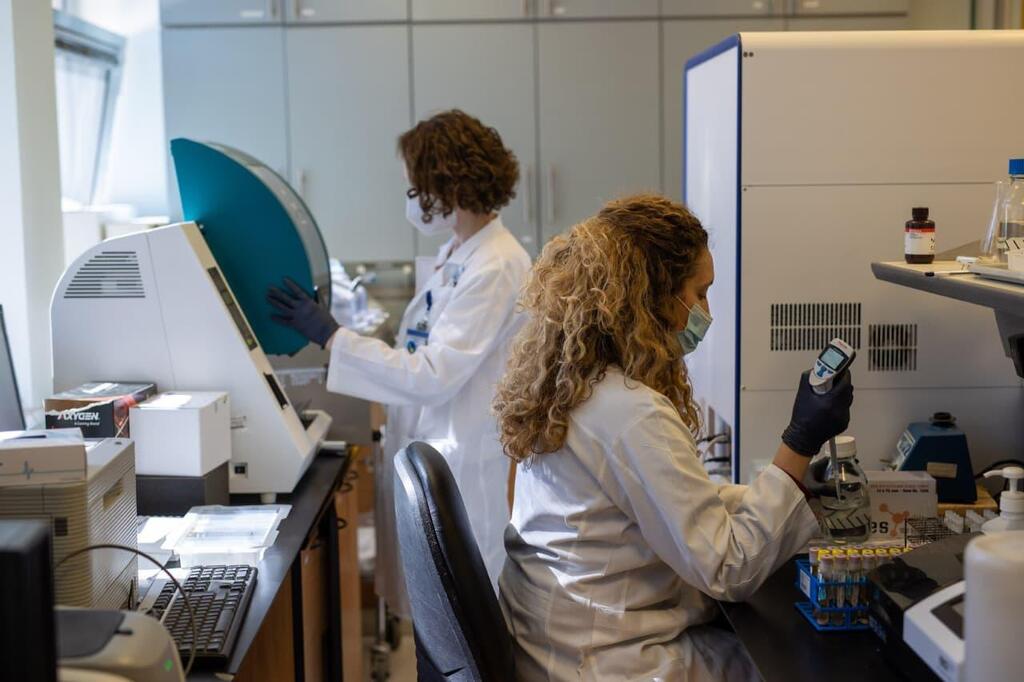With each passing month of the war, Prof. Ido Wolf's concerns deepen. As the head of the Oncology Department at Sourasky Medical Center, a preeminent cancer specialist in Israel and the dean of the School of Medicine at Tel Aviv University, he shares a deep-seated worry about a gradual boycott targeting Israel.
"In the past six months, the damage has become very apparent. Whereas pharmaceutical companies used to seek us out, today we have to fight them just to be included in a trial. Even scientific journals that used to favor and publish our articles are now rejecting us with various excuses. I'm talking about a new and threatening reality, one that we did not know in the past and certainly not to this extent," he says.
During a conversation in his hospital office, Prof. Wolf shared his anxieties about the trajectory of Israeli research, previously a leader on the global stage, and Israel's reputation as a hub of medical excellence.
"People often ask me if due to the war, there is a boycott against medicine and doctors in Israel, and I say 'no.' There's no overt boycott. An overt boycott comes with blunt and crude statements and public actions, like demonstrations. But what cannot be ignored is the creeping, low-key, underground boycott, whitewashed with legitimate excuses and disguised as something tolerable and forgivable, but it's doubly dangerous compared to a clear boycott that we know how to fight against or that ends on its own," he says.
"In contrast, there is no way, means or ability to fight against something elusive and fluid that creates an underground boycott. And I am certain that as the war drags on, Israeli medicine will lose its global scientific leadership."
Last week, a striking study led by Prof. Wolf revealed that popular artificial intelligence (AI) large language model (LLM) ChatGPT outperformed doctors on specialist licensing tests. This research, featured in The New England Journal of Medicine, represents just a segment of the innovative contributions from Israeli doctors to prestigious academic journals. The concern looms that such achievements may soon be jeopardized.
So how does this low-key boycott come into play?
"I'll begin with the sentiment that is conveyed to us: 'Why would you suddenly boycott Israeli medicine? What kind of boycott are you even referring to? It's merely that we no longer wish to collaborate with you. You're not presenting yourselves well.' This is a sentiment that cannot easily be pushed aside, yet accepting it is profoundly challenging.
"The situation is far more intricate than a simple yes or no to a boycott. Science thrives on international cooperation among doctors and scientists, grounded in academic freedom, openness and the sharing of ideas. Absent these robust, ongoing and open collaborations, the extensive groundwork that supports science in all its forms—including medicine, agriculture, the military and various technological advancements—crumbles.
"Lacking these foundational elements, Israel, as a developed and leading nation, not only faces risks but is genuinely in jeopardy of losing its global stature as a leader in high-tech and advanced medicine."
Different schools of science have been boycotted in Israel before. Why the worry?
"I'm referring to a year and a half ago, during the days of the judicial reform, which were the breeding ground for the beginning of the disengagement from Israel. I remember that at every conference I attended, whether as a speaker or a listener, I was repeatedly asked 'What's happening in Israel? What's the state of democracy there? Academic freedom? Civil rights?' and I found myself constantly on the defensive. But these questions, asked at conferences, stayed at the conferences and did not affect our fruitful collaborations with the world's leading medical centers. In the last six months, the damage has become clearly identifiable."
Are there other reasons for this hostility toward Israeli medicine?
"Events unfolded progressively, and every element of the tightening noose contributed to growing antagonism. Israel has faced wars before, a known reality to our international peers.
"However, we have not seen an extended conflict that generates reasons to avoid Israel—from seemingly minor issues like flight cancellations to serious concerns such as racism and antisemitism. Before October 7, when circumstances were more stable and the skies more open, I regularly welcomed different delegations each week."
Prof. Wolf expresses his apprehension about the ongoing, subtle boycott's tangible effects on Israeli medicine, impacting all Israelis. "Right where you sit, I used to have top executives from pharmaceutical companies seeking me out, and world-renowned scientists and thought leaders came to explore and engage with Israel's sophisticated medical sector, looking to start collaborative research projects.
"Now, that reality is eroding. Scientists hesitate to visit a nation in conflict, pharmaceutical firms are recalculating their risk assessments, and I fear the day they choose to cut back on our connections—why would they risk it? Without these connections, there are no clinical trials, no research, and patients ultimately pay the price."
Things seem dire. How would we rebuild Israel's image within the international scientific community?
"Let's go back three years to the COVID-19 pandemic. During that time, the pioneering research we carried out in Israel set us apart as a beacon for the global scientific community. Our trials were successful and placed us at the forefront of battling the virus. Scientists and doctors across various disciplines revered and praised us, often saying, 'Well done, you are great.' We were at the top of the scientific community.
"However, over the past six months, our standing has drastically declined from the highest to the lowest within the global medical community, leaving us on precarious ground. Tasks that were once straightforward, such as leading research initiatives or engaging in international collaborations, have become challenging and complex.
"The Israeli scientific community is now fervently working to demonstrate to the world that, despite the ongoing conflict here, we continue to push forward with our research and experiments. This effort is crucial for our survival because if we are excluded from collaborative projects, our resources will dry up and if we fail to stay active in the scientific arena, we risk being forgotten."
Does this boycott impact the careers of Israelis performing residencies around the globe?
"I am aware of instances in the United States where Israeli doctors have been denied opportunities for specialization. In fields like oncology, I depend on colleagues and friends I've met through collaborations over the years. They are genuine friends who express their concerns to me. They occupy prominent positions, and not all of them are Jewish. They either understand or are concerned about the ongoing specialization of Israeli doctors.
"Ultimately, these relationships are personal, built from scientist to scientist, not from nation to nation. As these scientific bonds form, they often lead to friendships and partnerships. It's natural that we would want to continue these collaborations. However, what used to be taken for granted now seems uncertain. We are making efforts to sustain ties with those who were once our friends. Nowadays, some are less eager to publicly acknowledge their friendship with an Israeli research physician."
Prof. Wolf, a top doctor in his field and a member of both the American Association for Cancer Research (AACR) and the American Society of Clinical Oncology (ASCO), has attended numerous global conferences.
Recently, Israeli doctors have sensed a chill from their international peers, leading to less frequent travel to conferences. "I have always proudly represented the advancements in oncology from our country, and I can't remember a time since the start of my career when I was absent from conferences for more than six months.
"Conferences are vital for meeting peers and leaders in cancer research and treatment. The personal connections made there are crucial for all collaborative efforts. Whether our respected status at conferences remains intact will be seen in June, at the annual oncology conference in Chicago. This event is renowned as one of the largest and most influential in the field, with over 25,000 oncology scientists from around the world attending.
"Will we still be welcomed warmly this year? I'm not sure, but what has become evident since the start of judicial reform is that every Israeli participant will need to stand in defense of Israel."





